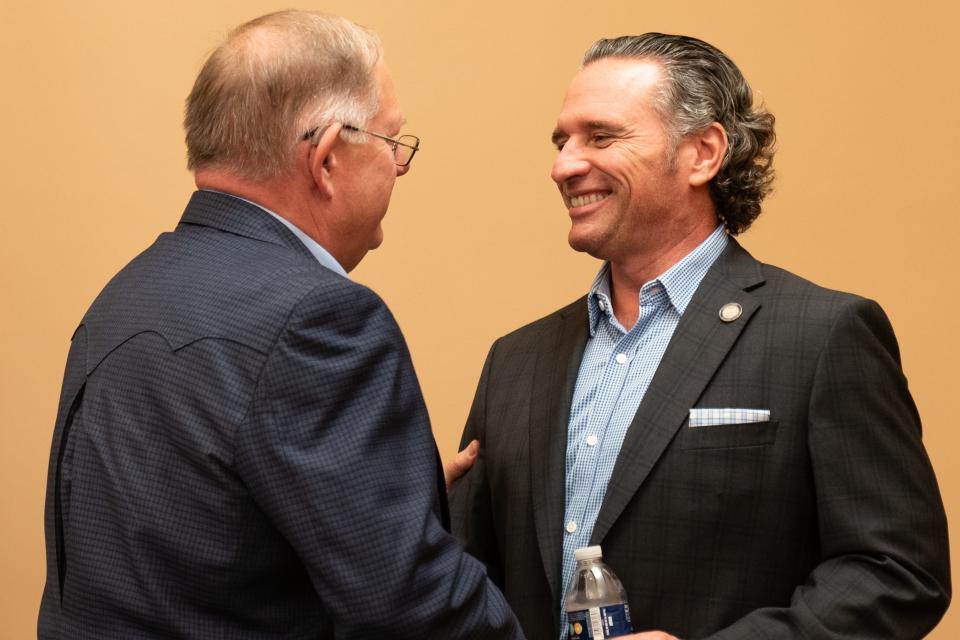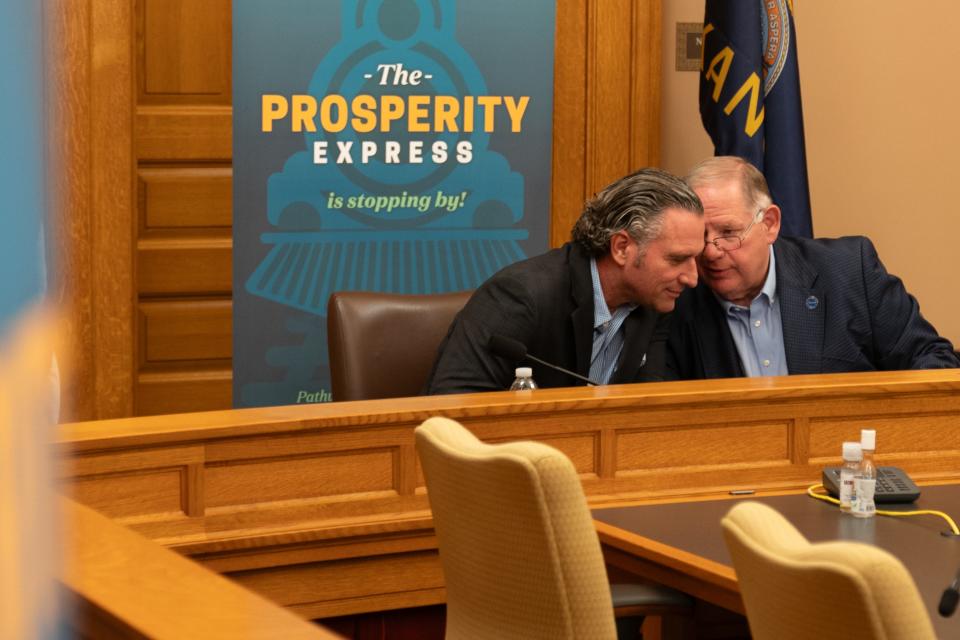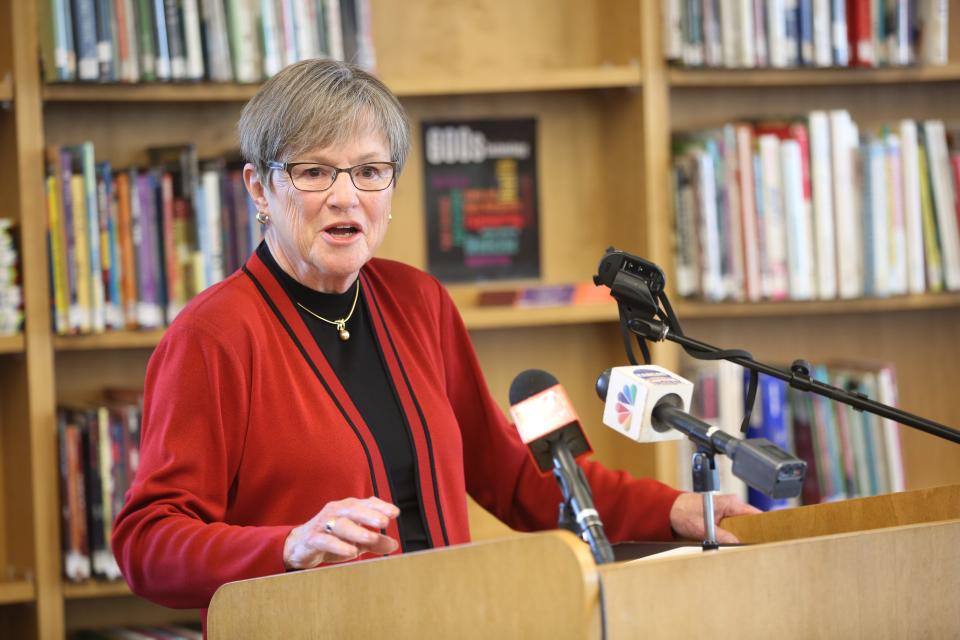Kansas Republicans want an income tax cut. Can they override Laura Kelly's veto next year?
- Oops!Something went wrong.Please try again later.
The Legislature's top two Republicans have embarked on a statewide campaign to promote a controversial income tax cut that failed to become law last session — and there is no clear plan for how it would become law next year.
Enacting a single rate income tax, also referred to as a flat tax, is a top priority of Senate President Ty Masterson, R-Andover, and House Speaker Dan Hawkins, R-Wichita.
"I may be a little bit aggressive in this, but I want to see it teed up within in the first few weeks," Hawkins said.
But Democratic Gov. Laura Kelly has indicated she won't ever sign a flat tax bill.

"You know, I think I've been pretty clear over time that I think the flat tax is very irresponsible," Kelly told reporters on Thursday. "And it will take us down a path we don't want to go, sort of back to the days when we weren't able to fund our schools and our roads and everything else.
"I think there are ways to do responsible tax cuts. I offered several options last year to the Legislature. They're dead set, at least some of them are dead set, on this flat tax, which won't work. So we will have to negotiate it as we go through the session. But I don't plan to react any differently to a flat tax proposal this year than I did last year."
Which leaves GOP leadership in the position of needing the support of all Republicans in their slim supermajorities. Last year, the flat tax narrowly died in the Senate in a dramatic pair of late-session votes as a trio of Republicans flip-flopped.
So what is the plan to get those and all other Republicans on board?
"We're going to talk to them," Hawkins said.
"All of those members you mentioned," Masterson said of Republican Sens. Rob Olson, Carolyn McGinn and Alicia Straub, "have been out on the campaign trail in the past promoting themselves as champions for the taxpayer. I think what you saw last year was political gamesmanship, and I'm just hoping they realize it's about their constituents and not about themselves or about me."
While the Kansas Chamber isn't involved in the tax-cutting campaign efforts, president and CEO Alan Cobb said it remains in support of a single rate income tax.
"I hope there's some tweaking that you can get the governor support, and if not, yeah, we'll look for an override," Cobb said.
If it comes to that, Cobb said, he is guessing that Republicans will have the votes needed this time around.
This year's GOP tax cut plan will be similar to last year's failed plan

Masterson and Hawkins have teamed up with Americans for Prosperity-Kansas on a statewide campaign to promote their tax cut plan. Their "Prosperity Express" stopped in Topeka on Thursday.
They said the details will be largely similar to last session's plan, featuring their priorities of a single rate income tax and elimination of state taxes on Social Security income. But there won't be a provision to accelerate the end of the food sales tax. It would add a state property tax cut while repealing an unfunded program intended to help local governments cut property taxes.
"Nobody likes income taxes, so why did Gov. Kelly say no to creating prosperity and lowering taxes for Kansans?" said a video played by AFP at the event.
The state currently has a progressive income tax structure. The design of the Republican single rate plan is most beneficial to the lowest and highest income earners while providing less benefit to those in the middle. The substantial benefits for the richest Kansans are a top criticism for Democrats, while Republicans are quick to point to the substantive benefits for the poorest Kansans.
"Gov. Kelly's veto makes the people who earn the least hurt the most," the video said. "And Kansas doesn't need higher taxes. We have a $3 billion budget surplus in the bank. So guess what, Gov. Kelly, Kansas lawmakers will be bringing back the single tax rate in the next legislative session."
Bundling of tax policy could risk failing to pass any tax relief
Kansas does have a burgeoning budget surplus that Republicans and Democrats agree should go toward tax cuts, but they disagree on how. Michael Austin, an AFP lobbyist, likened the surplus under Kelly to a "mountain of your cash that she is sitting upon."
The bundling of various tax policies makes it impossible to pass broadly supported tax cuts without passing controversial ones, leaving legislators and the governor with taking all of it or none of it.
"Ty and I were astonished when the governor actually decided to veto that plan because it had so many good things in it," Hawkins said.
The reason for bundling, Masterson said, is "because we think that is the most important structural thing in the tax plan, and we're willing to get other things to get there."
But that also risks a situation like last year, where a veto without an override leaves Kansans without any tax relief, and such a possibility could happen again this year.
"There's always that concern simply because we've got to come up with a supermajority," Hawkins said.
Laura Kelly calls GOP tax plan irresponsible

Hawkins said their tax plan is sustainable and responsible.
Kelly disagrees, calling it irresponsible and predicting that it would have led to budget cuts, especially for rural public schools.
"My main concern is what it would do ultimately to revenues coming into the state," Kelly said after an event at Seaman Middle School. "You know, we've lived through a tax disaster. Back in 2012, 2013, when we had the great tax experiment, we saw what happened to our state.
"We saw that we're not funding our schools. We're not funding our roads. We're not funding our foster care system. We're not doing anything, and things were absolutely falling apart.
"So yes, I want that (flat) tax not to happen so that we can continue to fully fund our schools, but also everything else. The implications of the flat tax are such that while it wouldn't be as fast and dramatic as the Brownback tax experiment, ultimately it would have the same impact as it drains revenues from state coffers. And that would force us back into making some of the same cuts."
Jason Alatidd is a statehouse reporter for the Topeka Capital-Journal. He can be reached by email at jalatidd@gannett.com. Follow him on Twitter @Jason_Alatidd.
This article originally appeared on Topeka Capital-Journal: Kansas Republicans push flat tax amid threat of a Laura Kelly veto

